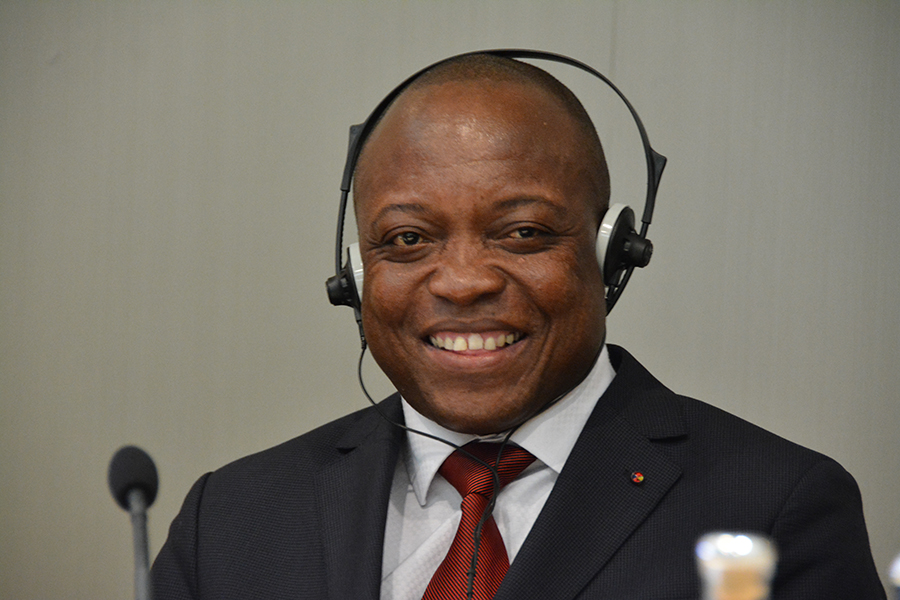Strengthening the Central African Republic’s Justice System and Operationalising the Special Criminal Court
(Download programme: EN, FR)
(Download report: EN)
On Wednesday, 16 November 2016 at the Hotel Silken Berlaymont in Brussels, Flavien Mbata, Minister of Justice of the Central African Republic provided a keynote address for a roundtable on the Central African Republic’s judicial system and the Special Criminal Court. Hosted by the Africa Group for Justice and Accountability, the Wayamo Foundation and the International Nuremberg Principles Academy. The Africa Group was represented by expert consultant Didier Preira, former Deputy Registrar of the International Criminal Court. Directors Bettina Ambach and Klaus Rackwitz represented the Wayamo Foundation and the International Nuremberg Principles Academy respectively.
“Justice for serious crimes is necessary for sustainable peace in the Central African Republic,” said Mbata in his keynote address. “The fight against impunity is a means of ensuring national reconciliation, which would break with past practices that encouraged chaos and violence.”
“The impunity reigning in CAR for decades has allowed and encouraged the commission of crimes,” he added. “Fair trials are not just an obligation toward victims, but would also send a strong message that serious crimes will no longer be tolerated in this country.”
The event focused on recent developments in the region and challenges facing the establishment of the Special Criminal Court. Held on the margins of the European Union’s Brussels Conference for the Central African Republic, the roundtable also helped to clarify what financial and technical assistance the international community could provide to the Central African justice sector.
The roundtable brought together different perspectives on the proposed hybrid tribunal, including those of civil society and the United Nations. Netsanet Belay of Amnesty International and Florent Geel of the Federation Internationale des ligues des droits de l’homnes, emphasised the importance of victim participation and effective outreach so that the Central African people had realistic expectations of the SCC.
Drawing on her work in the Office of the UN’s Special representative on sexual violence, Sofia Candeias highlighted the importance of accountability for sexual and gender based crimes in the specific historical and political context of CAR.
Meanwhile, Deputy Special Representative of the Secretary General, Resident Coordinator of the United Nations System Fabrizio Hochschild and former Ambassador-at-Large for War Crimes Issues, Office of Global Criminal Justice, U.S. Department of State Stephen Rapp drew attention to the benefits and limitations of a hybrid court in a post-conflict zone, in particular the Special Criminal Court’s relationship to the wider Central African judicial system.
Various panelists discussed recent progress in establishing the Special Criminal Court, with Christian Londoumon, president of CAR’ Court of Cassation, providing a detailed update on the recruitment of the Special Criminal Court’s international and national staff and the Central African Minister of Justice answering questions from the audience about the government’s policies on international criminal justice.
Moderated by Patryk Labuda, Visiting Fellow at the Lauterpacht Centre for International Law, University of Cambridge, the debate included contributions from:
- Netsanet Belay Africa Director, Research and Advocacy, Amnesty International, Johannesburg
- Sofia Candeias Judicial Affairs Officer, Team of Experts; Office of the United Nations Special Representative of the Secretary-General on Sexual Violence in Conflict
- Florent Geel Africa Director of the International Federation for Human Rights (FIDH)
- Fabrizio Hochschild Deputy Special Representative of the Secretary General, Resident Coordinator of the United Nations System, Humanitarian Coordinator, and Resident Representative of UNDP in the Central African Republic
- Christian Londoumon President of the Court of Cassation (CAR)
- Stephen Rapp Distinguished Fellow at The Hague Institute for Global Justice, former Ambassador-at-Large for War Crimes Issues, Office of Global Criminal Justice, Department of State, United States of America
The side event marked the continuation of efforts by the Africa Group for Justice and Accountability and the Wayamo Foundation to engage in the Central African Republic. On 22 September 2016, the Africa Group hosted a multi-stakeholder conference in Bangui, entitled Special Criminal Court for Central African Republic — Context, Challenges and Perspectives, where national and international stakeholders reflected on how the soon-to-be-established SCC will operate and what challenges its mixed international and national court staff will face.
Africa Group members Hassan Bubacar Jallow, the former Prosecutor of the International Criminal Tribunal for Rwanda and Catherine Samba-Panza, the former Transitional President of the Central African Republic also led an expert delegation offering the Africa Group’s assistance and expertise to key stakeholders in the Central African Republic.


